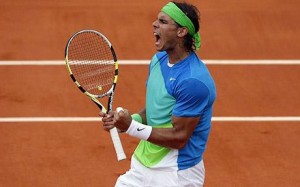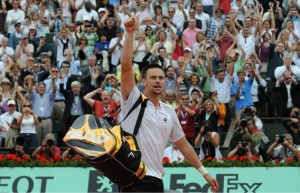Roundup: What Roland Garros 2010 Means For …
Rafael Nadal: There was a sense going into this final that the Majorcan Mauler was vulnerable, based on the premise that he faced a player who had demonstrated the ability to beat him and whose game appeared a good matchup with his.
When he denied those four break points in the second game of the second set, retrieving huge forehands that would have won the point against pretty much anyone else, it was clear: Rafael Nadal had been saving his best for the final.
Those earlier matches when he had committed more errors than usual, had not been the usual human vacuum cleaner on defense, and had allowed less patient or less potent opponents to stick around had been by design. Nadal has learned that he can save his knees and still dominate the field here, and he has that extra gear he can find if he really needs it.
Soderling didn’t play his best in the final, but that’s why he is a very, very good player, and the Spaniard is an all-time great.
With this win, Nadal moves past Stefan Edberg and Boris Becker in the Slam count and into a tie with Mats Wilander and John McEnroe (at least as a singles player). Tennis historians may feverishly debate who is the better of that triad, but it may be a moot point soon – Nadal will have two more chances to add to his total this year.
Plus, as a bonus, this is the first major he’s ever won without having to beat Roger Federer on the way. That, combined with his return to glory following a year-and-a-half-absence from the final round of a major, means that this event was about him, as opposed to being about who he was taking the title away from.
Robin Soderling: In another era the big Swede could’ve won a Roland Garros title, or maybe a couple. Seeing as how Jim Courier did so by employing similar weapons, and Sergi Bruguera and Thomas Muster were dominant on the surface despite game plans that were less-than-varied, it stands to reason that a guy who hits as hard as Soderling and isn’t bothered so much by the high bounce of clay could have been a world-beater there.
Along with the sadly absent Juan Martin del Potro, Soderling wields what must be by now considered the hardest forehand in the game. There are weaknesses there, though, particularly in his transition to net, and he has had the misfortune of reaching two straight RG finals only to meet players who could expose that shortcoming.
Soderling has now made a name for himself by knocking out one of the two RG favorites and thus paving the way for the other to take the title for two years running. For him to actually win it, though, may require someone to pave the way for him.
In the meantime, being twice an RG runner-up may not get him into the Hall of Fame, but it certainly pays the bills.
Tomas Berdych: When he beat Federer at the 2004 Summer Olympics, who would have guessed that the big Czech would need six more years to reach his first Slam semi? It was, for the most part, a great tournament for Berdych, whose win over Andy Murray was his first over a top 10 player at a major.
But his loss to Soderling leaves questions, and not just about his tactics. He was leading the Swede before his first-serve percentage dipped, exposing a much weaker second delivery. His ball-striking off both the forehand and backhand wings allows him to hit winners with stunning ease, but a second serve vulnerability will continue to be his undoing in the majors if it is not corrected.
Jurgen Melzer: The Austrian whose shotmaking ability reminds of some of Marcelo Rios’ better days had a great run. He sent David Ferrer home a lot sooner than expected, then pulled off a stunning comeback against Novak Djokovic while down two sets and a break.
His early hitting and accuracy were fun to watch, but his lack of heft was made clear against Nadal, who survived some very poor serving in set three to put the 29-year-old away in straights. We don’t expect to see you here again, Jurgen, but thanks for the memories.
Roger Federer: The following statement may be shocking, but I have a sneaky suspicion that grass will be good for the Swiss’ game. His quarterfinal exit must sting, but time and again the lawns of the Halle warm-up event have been his Fortress of Solitude.
He’ll be one of the favorites at Wimbledon, and his supporters can take comfort in that. What is less comforting is the idea that the end of his immaculate Grand Slam-semifinal streak signals that Federer is probably now in the phase of his career where breaking new ground is unlikely, and repeating old feats is getting tougher.
He’ll win more majors, but his wins there now will be epic journeys, achievements that will feel, at least to him, nearly as grand as that first Wimbledon or first RG.
They’ll be tough, but they will come.
Novak Djokovic: The Serb’s surprise loss to Melzer represents …
The Serb’s surprise loss to Melzer repre…
The Serb’s …
Please don’t make me do this.

